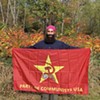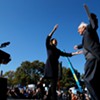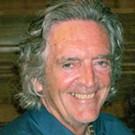Published December 17, 2003 at 5:06 p.m.
Frederick Buechner isn't imitating Yogi Berra when he describes himself as "the most famous author no one has heard of." But like the Yankee philosopher-catcher, Buechner illuminates an odd truth through a paradoxical comment.
The 77-year-old southern Vermonter has written more than 30 books, almost evenly divided between fiction and non. Buechner (pronounced Beek-ner) writes for a fairly small but intensely loyal audience that, like him, has an unfashionable fascination with questions of faith and even -- dare one say it? -- God. He and his readers are generally out of sync with a secular and often profane culture that regards the mention of things divine in polite conversation as a faux pas comparable to lighting up a Marlboro.
"It's the kiss of death for any author to say he or she is a religious writer," Buechner acknowledges during a recent conversation at his home in Rupert. "People will think you're writing propaganda."
The size of his potential audience dwindles further, Buechner notes, when it's discovered that he's also a Presbyterian minister. He jokingly refers to his 1958 ordination as "the worst career move I ever made."
In addition to repeatedly examining themes of little interest to many Americans, Buechner might be seen as something of a literary has-been. His biggest success came with his debut novel in 1950. The New York Times bestseller A Long Day's Dying was written during a summer sojourn in Maine shared with the poet James Merrill, a prep-schoolmate and close friend of Buechner's until his death in 1995.
Although Buechner's work never reached as wide a readership in the half century that followed, one of his novels, Lion Country, did receive a National Book Award nomination in 1971. Another, Godric, was a runner-up for the Pulitzer Prize 10 years later. Buechner has also remained an inspiration for a few authors who are both famous and heard-of, such as Annie Dillard.
The semi-obscurity that has come to enshroud Buechner's work is more a product of cultural prejudice than of any preachiness on the part of the author. In his novels, Buechner is no more -- or less -- a religious moralist than is Graham Greene, a questing Catholic whose own work has never fallen out of favor. Readily acknowledging his indebtedness to Greene, Buechner confesses, with Berra-like hyperbole, "Everything I've written has been a rewrite of The Power and the Glory." The outlines of many Buechner characters can indeed be seen in Greene's worldly "whiskey priest" who's both hunted and haunted.
Godric, for example, is a fictional account of the life of an actual 12th-century English saint who's made to seem more salty than holy. Buechner depicts Godric at the end of a very long life that has left him sexually unsated as well as prone to belching and farting. Godric may be virtuous but he's certainly not decorous.
Buechner's style in Godric is even more compelling than the character he created. The novel is written in a kind of medieval English that's lilting yet not off-putting to contemporary readers. After only a few pages, one grows comfortable with the antiquated cadence and syntax, and from then on, the book tickles the internal ear.
The disreputable Rev. Leon Bebb, introduced in Lion Country, is another likable conniver whose excesses Buechner tracks over the course of three more novels. Bebb dispenses mail-order degrees from a shady Bible college that he runs from the garage of his Florida home. Bebb babbles on and on about God, and although he's obviously a fraud and a reprobate, readers can't help but consider that maybe he's on to something important and genuine.
"I write about real people moving in a world in which God seems to be present, but so do a lot of other things," Buechner says. "In my own life, I have heard whispers from the wings, always ambiguous, always impossible to prove, but always of enormous power."
*****
Buechner sits surrounded by the comforts of the "Magic Kingdom," the name he gives to the sun-lit library in his refurbished 19th-century farmhouse. The title is testament both to a childhood love of The Wizard of Oz that he's never outgrown and to the wonders he's encountered in the realm of the literary imagination. The Magic Kingdom is a semi-sacred space, filled with collectors' editions of books that Buechner seems to value as much for their publishing pedigrees as for their contents.
The setting of the house itself is entirely idyllic. Its paddocks and pastures abut the Merck Forest and Farmland Center, a southern Vermont version of Shelburne Farms, though not as manicured and altogether lacking in architectural elegance. Buechner's wife, Judith, is an heir to the Merck pharmaceutical fortune, and the adjoining 3100-acre public preserve was once the family's private property.
The couple has three adult daughters, one of whom is a minister at the United Church of Christ in Westford.
The Buechners moved to Rupert on a full-time basis in the late 1960s, although they now winter in Florida. Fred Buechner, a clear-eyed and silver-tongued raconteur who looks to be in his early sixties rather than mid-seventies, says he loves living in Vermont despite being "such an indoor person." And though he has neither Judith's hands-on love of horses nor her ability to "name every tree around here," it's easy to see why Buechner feels so much at home in Vermont.
He's a liberal -- politically as well as theologically. Buechner has nothing nice to say about the professed Christian who currently inhabits the White House, and he regards pederast priests as "evil manifest in society." He also counsels vigilance and resistance toward those who would break down barriers between Church and State.
But Buechner is much more an aesthete than an activist. His attitudes toward politics are those of an observer, not a participant, as becomes evident when he is asked about the Rev. William Sloan Coffin, a leading advocate of draft resistance during the Vietnam era. The two have much in common: both are transplanted New Yorkers who made their way to Vermont; they attended Union Theological Seminary in Manhattan at roughly the same time; each has written an autobiography; and they define their respective ministries in broad, non-traditional terms. Buechner, for example, has never presided over a church, though he does occasionally give guest sermons in Manchester, VT, which invariably draw standing-room-only congregations. "Writing books is as much a ministry to me as is tending to the sick," he says.
Buechner has known Coffin for many years, and says he is a great admirer of the former Yale chaplain. "But Bill is such an activist," Buechner adds. "I always felt irrelevant and inadequate when I was around him."
Buechner's views on religion -- and on those who practice it ostentatiously and zealously -- also set him apart from many secular liberals. His tolerance is so all-encompassing that it extends to evangelical Christians as well as to atheists.
During a recent visit to Wheaton College, an evangelical institution near Chicago that has become the repository of his papers, Buechner says he overheard one student asking another, "So, what has Jesus been doing in your life this week?" To Buechner, it's heartening to encounter young people "who aren't ashamed to talk about God.
"I don't think like an evangelical," Buechner adds, "and they read the Bible in a much more literal way than I would, but at Wheaton I found evangelicals who are just as open to things as I am."
While "proud and happy to be a Christian," Buechner doesn't seek to exclude anyone from God's grace. "I don't think of Christianity as the only route. Remember, Jesus isn't saying that the way lies through his church but through his life. And that is to be found in a lot of people who have never heard of Jesus."
Buechner finds much to admire in Buddhism, for example -- as evidenced by the many Buddhist works that have been admitted to the Magic Kingdom. "It's so unlike Christianity in its metaphors, but in its mysticism and its ethics, it's very similar," Buechner says. As a practitioner of the Western intellectual and cultural tradition, however, Buechner says he has found it difficult to embrace an Eastern faith.
Besides, in Buechner's view, belief itself is something to be continuously questioned. As he writes in one of his non-fiction works, Wishful Thinking: A Theological ABC (1973), "doubts are the ants in the pants of faith -- they keep it awake and moving." Buechner's faith in God's existence is based, at least in part, on his unwillingness to countenance the opposite. "If there is no God, then life would be a black comedy. But I don't experience life that way. I experience it as mystery, as holiness," Buechner says.
What about the belief system of an atheist? What would Buechner say to someone who's sure there is no God? It's here that his liberalism reaches its apogee. "To a convinced atheist, I would first say, ‘Maybe you're right. Maybe you're seeing something I'm not seeing.' But I might also ask, ‘How does it feel to be so brave -- to see in life nothing other than what you read into it?'"
Buechner came to his own faith partly by way of happenstance. He says he was raised in a family that did not have any particular religious commitments. Materially, however, he was one of the blessed, attending a private boarding school in New Jersey as a prelude to his admission to Princeton. But Buechner's childhood was also marked by tragedy, in the form of his father's suicide -- an event that he has struggled to understand for the past 65 years.
Following non-combat service in World War II and subsequent graduation from Princeton, Buechner says he "happened to be attending church in New York one day when I came under the spell of a wonderful preacher" -- Rev. George Buttrick. In a relatively short time, Buechner says, he decided to enroll in Union Theological Seminary. "It was a time when every great religious thinker in the Western world was there. It was a marvelous experience that made me determined to become a minister -- to preach the good news."
Today, however, Buechner is blocked. He says he has made numerous false starts on what he hopes will become his next book, and nothing especially promising has emerged. Could it be a function of age? Does it just become harder to work when you're 77? Buechner doubts that's it. After all, he notes, Verdi wrote Falstaff when he was in his eighties.
And even if he never writes another book, Buechner has already given much wisdom to the world. Most of his works are still in print, easily accessible to anyone who cares to look.
More By This Author
Speaking of...
-

Major Fallout: UVM Scholars Argue That Cuts to the Humanities Would Imperil the University's Mission
Jan 27, 2021 -

UVM Announces Plan to Eliminate More Than Two Dozen Academic Programs
Dec 2, 2020 -

New Temple Sinai Rabbi David Edleson Embraces Tradition and Innovation
Oct 3, 2018 -

I'm in Love But He Doesn't Share My Religion
Dec 14, 2016 -

Keeping the Faith: How Compromise, Curiosity and Tradition Guide One Interfaith Family
Dec 6, 2016 - More »
Comments
Comments are closed.
From 2014-2020, Seven Days allowed readers to comment on all stories posted on our website. While we've appreciated the suggestions and insights, right now Seven Days is prioritizing our core mission — producing high-quality, responsible local journalism — over moderating online debates between readers.
To criticize, correct or praise our reporting, please send us a letter to the editor or send us a tip. We’ll check it out and report the results.
Online comments may return when we have better tech tools for managing them. Thanks for reading.














































